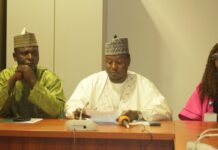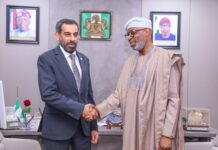Cristian Munduate, the UNICEF Representative in Nigeria has stated that strengthened civil registration, vital statistics systems, and digital identity frameworks can together drive positive change, promote inclusion, and contribute to the African development agenda.
Munduate said this in her statement during the commemoration of 2024 Africa Civil Registration and Vital Statistics Day in Nigeria.
The UNICEF Representative described the commemoration as a critical turning point for contemplation, cooperation, and action aimed at strengthening civil registration and vital statistics systems throughout the continent and, most importantly, in Nigeria.
She further noted that in addition to being an annual commemoration, the event further serves as a vital reminder of the work still to be done to fulfil obligations under the 2030 agenda for sustainable development and provide universal access to legal identification for all.
According to the UNICEF Representative, the theme chosen for this year’s commemoration, “Strengthening the Linkage of Civil Registration and Vital Statistics to Legal Identity Systems through Digitalisation for Enhanced Inclusion”, is both timely and essential. She added that it underscores the pivotal role that digital integration plays in harmonizing civil registration and vital statistics with legal identity structures. Her words: “Such harmonisation is not just a technical exercise – it is the backbone of a transparent, accountable, and inclusive governance framework that benefits individuals, communities, and societies alike.”
She also stated: “At the core of this effort is the creation of accurate and reliable population data. By linking civil registration and vital statistics to legal identity systems, we ensure the accuracy, completeness, and timeliness of records of vital events such as births, deaths, and marriages. Legal identity systems establish official recognition of individuals. This linkage is crucial for maintaining up-to-date demographic information, which is essential for effective planning, policymaking, and service delivery.”
She also asserted: “We encourage creating an institutional link between birth registration and National Identity Registration through allocating – Unique number or National Identity Number (NIN) at birth to every child in Nigeria living in specific locations (rural, urban, semi-rural, semi urban, rural slums and hard to reach areas) and secure their identity chain in the civil registration processes. We look forward to exploring broad areas on data security and management of civil registration and national ID systems.
“Legal identity is a fundamental human right. It is the gateway to accessing other rights and services. By linking civil registration and vital statistics with legal identity systems, we must ensure that individuals have the official recognition and documentation they need to exercise their rights, access social services, participate in economic activities, and assert legal claims. This is particularly crucial for marginalized children who are often excluded from these vital services.
“Linked systems provide valuable data for evidence-based policymaking, development planning, and monitoring progress toward national and international development goals. Governments, development partners, and researchers are called upon to use linked data to analyze trends, identify disparities, and target interventions more effectively, leading to more sustainable development outcomes for the country.
“Today, we are presented with an opportunity to ignite meaningful conversations about the importance of harmonizing civil registration and vital statistics with legal identity systems.
“Together, we can drive positive change, promote inclusion, and contribute to the African development agenda through strengthened civil registration and vital statistics systems and legal identity frameworks,” she added.
END












































